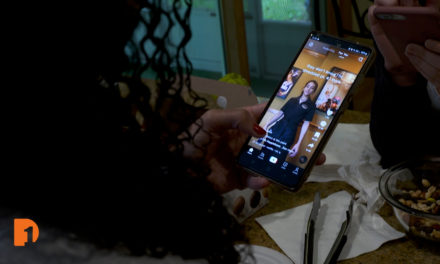We all have them— loyalty cards stuffed in our wallets or key tags hanging from our keychains, but the WRIF D.R.E.A.D. card may have just been the first loyalty program made specifically for rock ‘n roll music lovers. Known for its long history of zany, innovative radio personalities and unique marketing promotions, the WRIF D.R.E.A.D. card was the icing on the radio station’s promotional cake, circulating hundreds of thousands of cards across Detroit.
One Detroit senior producer Bill Kubota and “Detroit Remember When: Made in the Motor City” host Erik Smith sit down with several former members of WRIF Radio to hear more about the radio station’s rise to popularity in the late 1970s and 1980s and examine how it became one of the most well-known Detroit rock radio stations still to this day.
Full Transcript:
Erik Smith: These days, we don’t really give a second thought about all those loyalty programs, you know, the card you got in your wallet, those barcodes on your key. Well, ideas like that have to start somewhere, right? And maybe it was right here in Detroit. So, we’ll begin this story, let’s say, around 1976. That’s when Detroit got its first wacky FM rock morning guy. The guy who did all those crazy voices that he made up in his head over at WABX.
George Baier, WRIF 1979-1985: I stumbled on Steve Dahl at ABX, and he was doing something that nobody had ever done.
Anne Carlini, WRIF Radio: I didn’t wake up without listening to Steve Dahl. You know, he was the one who started doing all those funny voices, doing all the funny skits.
George Baier: The funny thing about Steve, he was doing these voices, right? And you could tell it was Steve doing all the voices.
Erik Smith: George Baier was just 20 years old, going to Wayne state and working at a gas station, and he did some funny voices to. Soon Baier turned up on the air, part-time with Dahl and talking like a pro wrestler at W4, another FM rock station.
George Baier: I Started doing, “The Bruiser” because Steve needed a bodyguard. In his, you know, in his radio world, he’s becoming so popular, he needs a bodyguard, who’s going to get four bodyguards? Just pick, “The Bruises”, he’s a wrestler from Detroit. Well, what does he do? I don’t know what he does, Steve, but he talks like this.
Erik Smith: Well, when Steve Dahl left for another job in Chicago, Jim Johnson stepped in playing straight man to Baier’s characters, and thus became the famous, “J.J. & The Morning Crew”.
George Baier: I was from east Detroit, Jim was from Redford, so why couldn’t we talk to somebody who’s was listening from Taylor?
George Baier: That was a part of the success, was the Detroit-ness of the show.
Erik Smith: It didn’t take long for things to heat up. In 1979, WRIF pulled out every stop in the books in the FM ratings war.
Fred Jacobs, WRIF 1981-1983: Jim and George really started making it happen at W4. And it became very, very clear to us that, that was really the missing piece of the radio station. I mean, we always had good morning shows, but we never really had that breakout show.
Erik Smith: ABC actually owned WRIF at the time, and, well, they also just happened to own Channel 7 as well.
Fred Jacobs: And if you remember the “We Got Who You Wanted.” campaign, right? Where they paired up Bill Bonds and John Kelly and Marilyn Turner.
Jim Johnson, WOMC Radio, WRIF 1979-1985: But then they decided, wait a minute, if it worked for our TV stations, why can’t this work for our radio stations.
Fred Jacobs: Really, in one day, we brought in Karen Savelly, and we brought in J.J. & The Morning Crew, which was really the big deal.
Erik Smith: Ken Calvert and Steve Kostan joined the team and thus began some very memorable promotions.
Steve Kostan, WMOC Radio, WRIF 1981-1995: It came out in the fall of 1979. Everybody was talking about that. It really had a big impact.
Anne Carlini: They called the commercial, “The Mouth”.
Jim Johnson: That probably was the best radio ad in the history of radio ads.
Erik Smith: Meantime, over in Chicago, Steve Dahl was causing quite the stir. Blowing up a bunch of disco records at a baseball game.
Steve Kostan: Disco had its run. It looked like it was going to take over the world and run the Aerosmith’s and the Led Zeppelin’s right out of business. It didn’t happen, of course, but it just was the right thing at the right time, and boy, it just took off
Erik Smith: With all that sudden disdain for disco, J.J. & The Morning Crew started their own special club.
Jim Johnson: You know, everybody steals promotions, and we thought this would be a good one to steal. Here in Detroit, we’ve got at least one or two disco stations, so why not go on the attack?
George Baier: Well, we got to call it something. OK, what are we going to call it? Let’s get Detroit in it, let’s get Detroit, and let’s get rockers in it, “Detroit Rockers That Hate Disco”, the RD… no, that doesn’t, that doesn’t sound like anything. What are you going to do?
Steve Kostan: D.R.E.A.D. It turned out to be, Detroit Rockers
Anne Carlini: Engaged in the Abolition of
Ken Calvert, WCSX, WRIF 1979-1991: Disco. I think Georgie came up with the with the card.
George Baier: Got to have your card! How can you be a card-carrying member if you don’t have a card?
Erik Smith: On morning radio, George Baier’s “Bruiser” was taking on really a life of its own. And soon, well, the real Dick Bruiser even came out to promote the station.
Fred Jacobs: When we put together, “The Bruiser Band”, which really turned out to be one of the greatest promotions ever.
Erik Smith: The Bruiser Band actually opened for a number of national acts, with George Baier singing parody songs, as you know, The Bruiser.
Ken Calvert: J.J. And the morning crew, Jim and George were really, really driving the radio station, and there’s no doubt about it. The credo of radio is, “So goes your morning, so goes your radio station”.
Erik Smith: Meanwhile, those D.R.E.A.D cards were such a hit, they were being upgraded to gold D.R.E.A.D Cards with actual serial numbers on them.
Jim Johnson: Somebody came up with a genius idea, I don’t know who it was, why don’t we combine this promotion with our advertisers, and offer people with these cards’ discounts at various retailers around town?
Fred Jacobs: It was great. You could go into Harmony House, which was the big record chain in those days, flash your WRIF gold card and they would knock a buck off any album. And we had the, you know, “Gold D.R.E.A.D card stickers accepted here”.
George Baier: So, then it kind of evolved to Detroit Rockers engage in the acquisition of discounts.
Erik Smith: Tens, maybe hundreds of thousands of those D.R.E.A.D cards actually circulated throughout Metro Detroit. Maybe there’s one still in your wallet or in one of your drawers somewhere, a reminder how a crazy radio promotion actually worked its way into our pocketbooks and sure into our hearts as well.
Subscribe to One Detroit’s YouTube Channel & Don’t miss One Detroit Mondays and Thursdays at 7:30 p.m. on Detroit Public TV, WTVS-Channel 56.
Catch the daily conversations on our website, Facebook, Twitter @DPTVOneDetroit, and Instagram @One.Detroit
View Past Episodes >
Watch One Detroit every Monday and Thursday at 7:30 p.m. ET on Detroit Public TV on Detroit Public TV, WTVS-Channel 56.





Where can I get my hands on a DREAD card. Mine got lost over the years.